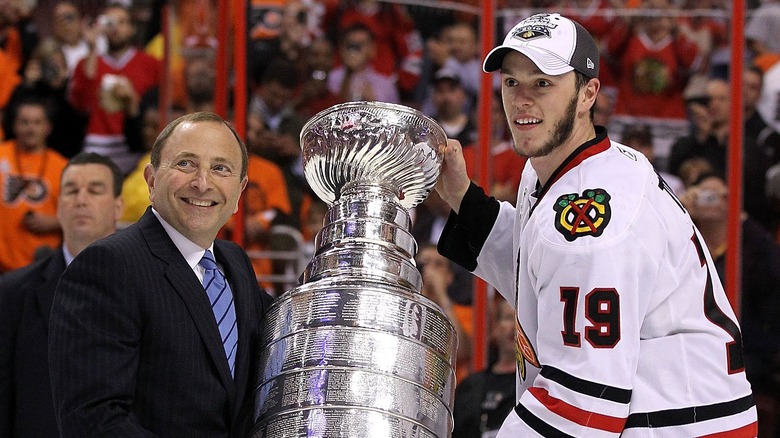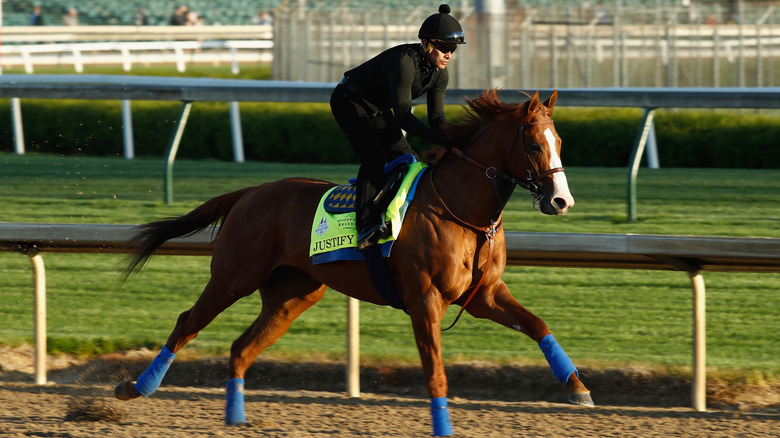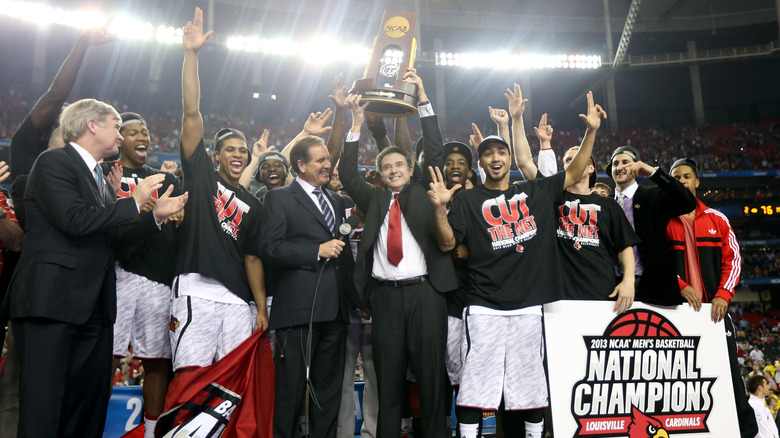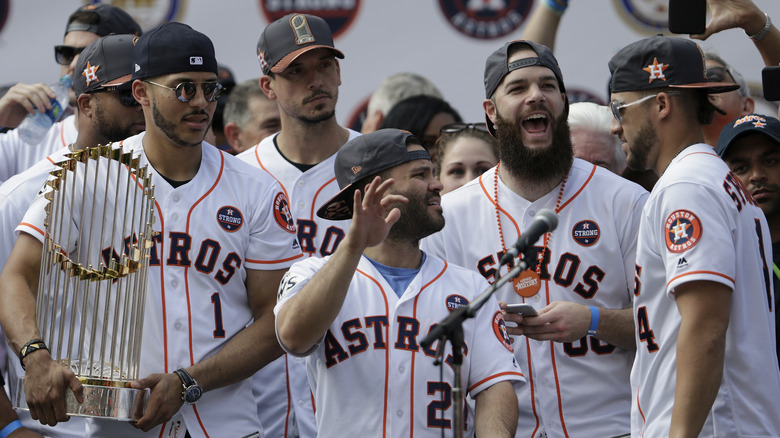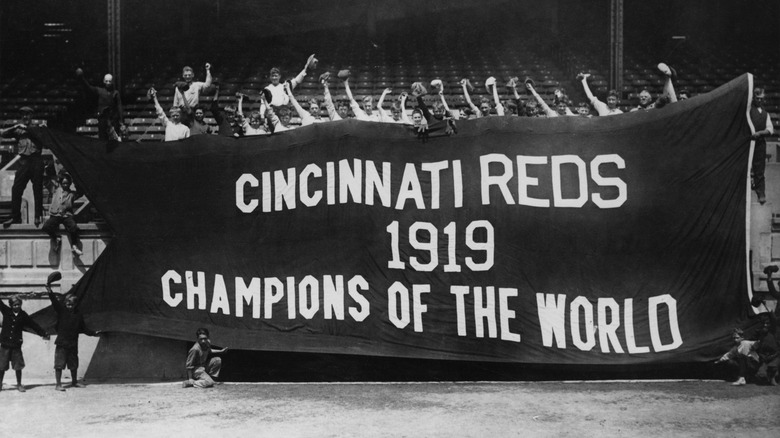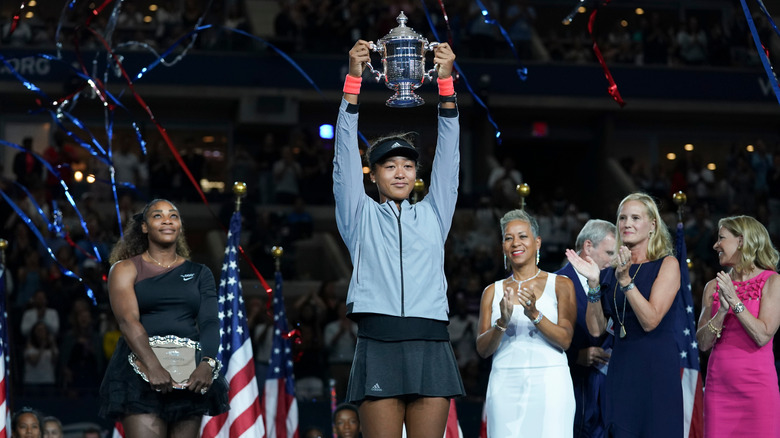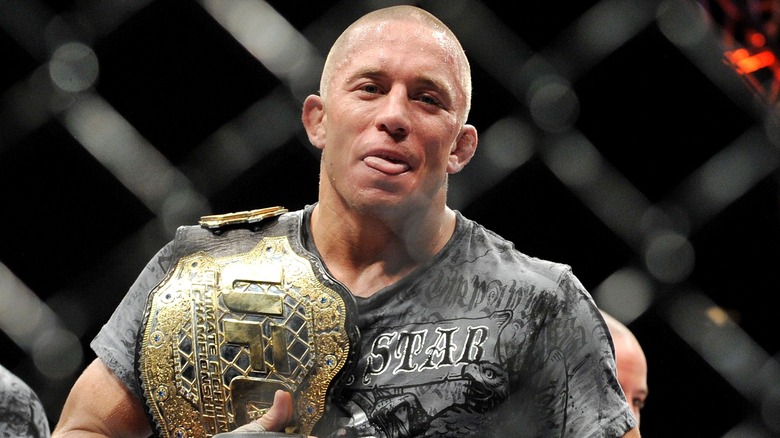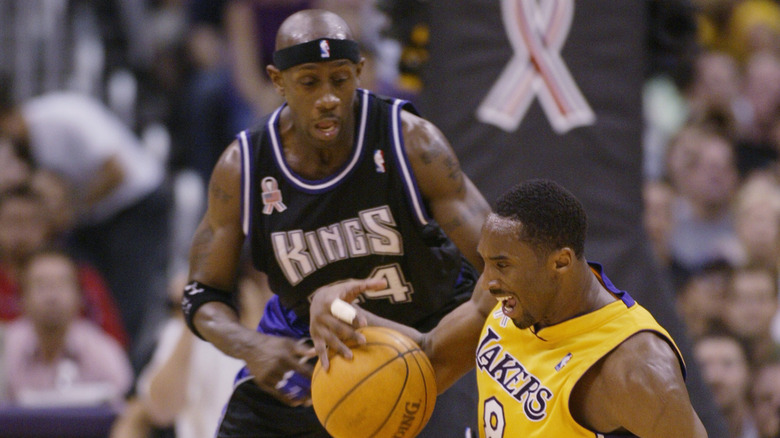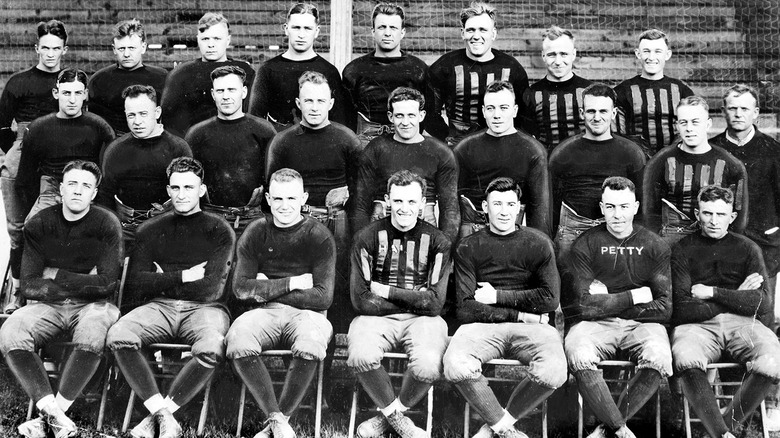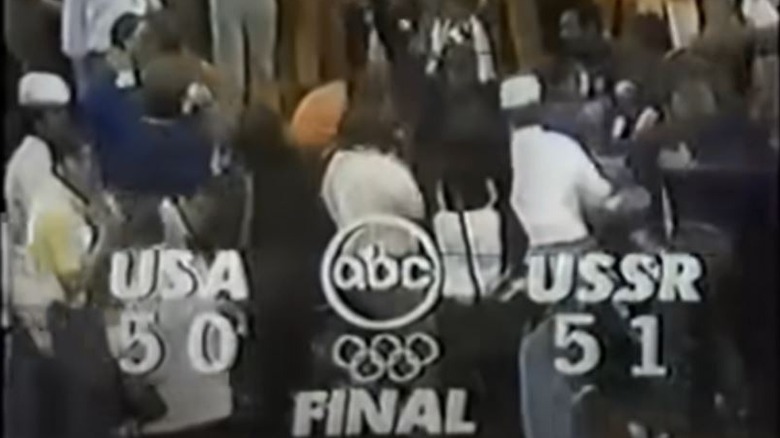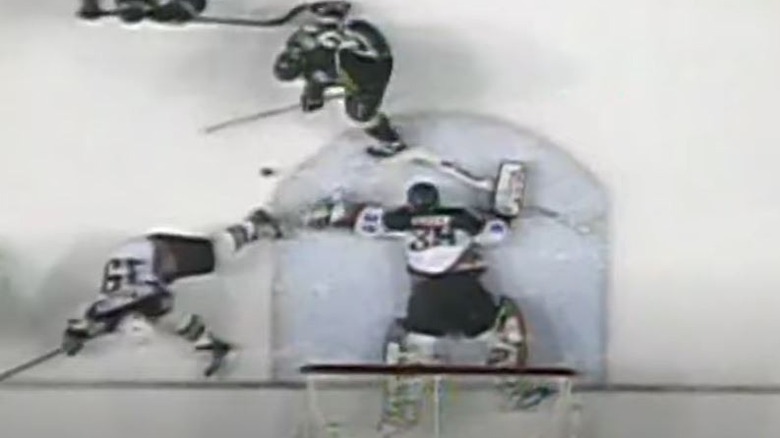Sports Championships Tainted By Controversy
Ask any fan of any sport from any era, and they'll tell you about how their preferred team or athlete was robbed. No matter how successful or pitiful the person or franchise, every fan can think of a blown call, or a questionable decision, or just a gut feeling that something was a bit too fishy. Some of these are valid — of course refs are going to miss calls and judged sports will draw lousy judges. Others of these are conspiratorial nonsense.
Occasionally, though, something genuinely controversial happens. We're not talking about a missed offsides call here or a gut feeling there. We're talking about something manipulated, shameful, or outright awful, occasionally going beyond the sports themselves and dealing with larger societal issues. And we're also not addressing regular season games — these are over championships. These are times that controversy projected the agony of defeat over the thrill of victory.
The Chicago Blackhawks, 2010 Stanley Cup Champions
2010 saw the Chicago Blackhawks win the Stanley Cup for the first time since 1961, the start of a mini-dynasty in the 2010s. The good feelings associated with this team, however, were forever tarnished in 2021, when it was revealed that management covered up an alleged sexual assault.
In May 2021, a former Blackhawk –- who later revealed himself as Kyle Beach –- filed a lawsuit alleging that he was sexually assaulted by Hawks video coach Brad Aldrich during the 2010 playoffs. TSN, who followed the case heavily, also noted that Aldrich is now a registered sex offender after he was convicted of sexually assaulting a teenager. It resulted in a lot of denials and deflections from current and former Blackhawks staff.
The Blackhawks commissioned an investigation by law firm Jenner & Block, who released a damning report in October 2021: Not only were the coaching staff and team management aware, they decided that they "would not alert Human Resources or do anything about the incident during the playoffs so as not to disturb team chemistry." The team let Aldrich take place in championship celebrations and allowed him to quietly resign in the offseason. The aftermath, documented by The Athletic, saw the resignation of several Hawks-related personnel. Even the players haven't escaped scrutiny: active players like Jonathan Toews and Patrick Kane denied knowing anything over a series of press conferences. Retired players from the 2010 team, like Brent Sopel, insist that everyone knew. At the request of the Blackhawks, Aldrich's name was crossed off the Cup.
If you or anyone you know has been a victim of sexual assault, help is available. Visit the Rape, Abuse & Incest National Network website or contact RAINN's National Helpline at 1-800-656-HOPE (4673).
Justify, Triple Crown winner
Justify made headlines around the world in 2018, when the horse — guided by trainer Bob Baffert — won the Triple Crown. It takes a lot for a horse to be famous, but earning a distinction shared by the famous horse Secretariat will do that. The recognition lasted for about a year, when the New York Times dropped a bombshell of a report: Justify failed a drug test before the Kentucky derby.
Justify was specifically popped for scopolamine, a performance enhancing chemical above certain quantities. The California Horse Racing Board debated internally about the violation for weeks and only told Baffert nine days before the Kentucky Derby. Part of what made it so contentious is that scopolamine is found in jimson weed, a plant that often accidentally gets mixed in with feed. Baffert later tweeted (via Reuters) that "I unequivocally reject any implication that Scopolamine was ever intentionally administered to Justify," and claimed it was environmental contamination.
Louisville Cardinals, 2013 March Madness winners
Scroll down the official list of March Madness winners on the NCAA website and you'll spot an oddity: Next to Louisville's name in 2013 is an asterisk. Scroll down to the bottom and you'll find the following text: "Louisville's participation in the 2013 tournament was later vacated by the Committee on Infractions." The NCAA vacating wins due to infractions isn't all that unusual. Vacating a NCAA Men's Basketball title, however, doesn't have precedent. And the reason for this is bizarre.
2015 saw the publication of the book "Breaking Cardinal Rules," in which sex worker Katina Powell claims that U of L basketball director Andre McGee paid her to have sex with Lousiville players and recruits (via Sporting News). This naturally got the attention of both the school and the NCAA, the latter of whom launched an investigation.
In 2017, the NCAA released a statement saying that McGee "acted unethically when he committed serious violations by arranging striptease dances and sex acts for prospects, student-athletes and others, and did not cooperate with the investigation." This is unique as far as recruitment violations go — normally it's more along the lines of "recruiter met privately with an ineligible student," not "school-sponsored sex parties." The NCAA doled out several punishments, including the forced vacation of all basketball records between 2010 and 2014.
The Houston Astros, 2017 World Series Champions
In 2017, the Houston Astros won their first ever World Series, beating the Los Angeles Dodgers in seven games. The team — full of exciting and exceptionally talented young players — was hard to root against and had the makings of a dynasty. Then, in November of 2019, The Athletic dropped a bombshell that forever tainted the team: The Astros spent that season stealing signs.
For the uninitiated, pitchers and catchers communicate what to pitch with hand signals. The mere act of decoding another team's signs is onerous, but legal. Using technology to decode, however, is very much against the rules. The Astros players and several coaches created a system: A camera was put in center field for Astros home games, which was streamed to a laptop in the dugout. The team would decipher the signs and relay what was coming to batters by banging on a trash can.
MLB conducted their own investigation, and both the management involved and the team itself were penalized with a fine and the loss of draft picks. Players were given immunity for taking part in the investigation (per Arizona Sports). A year after the scandal, CBS Sports noted that only a handful of people faced any consequences: The league suspended Astros manager A. J. Hinch and general manager Jeff Luhnow, and former Astros bench coach (and then-Red Sox manager) Alex Cora was fired. Carlos Beltran, one of the ringleaders of the scheme, resigned from his newly appointed position as Mets manager before leading one game. Fans booed the Astros at spring training games before COVID-19 ended the pre-season.
Cincinnati Reds, 1919 World Series Champions
No scandal in baseball history is more infamous than the 1919 "Black Sox" World Series fix. The broad strokes of it, recounted well by History, are well known among baseball fans: Several members of the Chicago White Sox conspired with gamblers to throw the World Series. Baseball players in this era were poorly compensated, and, as such, it's not all that surprising that a few disgruntled employees would throw a game if they could get a piece of the gamblers' action. The players involved were eventually discovered and permanently banned from the game.
Baseball fans have heard the story, but how often are the Reds mentioned? You know, the Cincinnati Reds -– the team the White Sox faced in the World Series? It's true that they had nothing to do with the fix, but they also won a series the other team was actively trying to lose -– shouldn't that put an asterisk on this? The Reds' own website still lists the 1919 World Series as a win, without any additional context.
Naomi Osaka, 2018 U.S. Open winner
The 2018 U.S. Open marked the first Open title vitory for Naomi Osaka. It was the coronation of tennis's fast rising star, and a victory over the legendary Serena Williams should have made this a legendary win. Unfortunately, the moment was spoiled by controversy, documented in detail by ESPN.
Over the course of the match, Williams got into several arguments with chair umpire Carlos Ramos. She received violations for coaching and destroying her racket. Eventually she got so angry with the officiating that she called Ramos a "thief" for taking away her point — which drew a third violation. The match was briefly halted after Williams demanded to speak to the tournament ref.
When Osaka won the match, the crowd at Arthur Ashe Stadium booed. Williams addressed the crowd and told them to stop booing. Osaka, with tears in her eyes, said, "I'm sorry. I know that everyone was cheering for her, and I'm sorry that it had to end like this. I just want to say thank you for watching the match." It's not often the winner has to apologize. There was worldwide debate about whether Williams was a victim of sexist double standards or bore the brunt of the blame. Months later, Osaka said (per the BBC) the memory was "bittersweet" and that "it wasn't necessarily the happiest memory for me."
Max Verstappen, 2021 Formula One World Champion
For the entirety of 2021, Formula One belonged to two men: Mercedes' Lewis Hamilton and Red Bull's Max Verstappen. The two drivers entered the final race of the season in Abu Dhabi with nearly identical records, and it was clear that whoever won this race would win it all.
In what Slate described as "a Netflix dream come true," Hamilton had a commanding lead for most of the race. With 10 laps left, even the Red Bull team said it would take "a miracle" for Verstappen to win. Apparently the universe heard this. After a car crashed on the 53rd lap, race director Michael Masi called for a safety car — all standard fare so far. What was less than standard fare was that Masi forced all the cars to queue behind the safety car in an orderly fashion rather than make cars unlap.
Verstappen took this opportunity to catch up a bit, pit, and replace his tires. Now that he was on fresh tires, and Hamilton was still trying to push to the end with worn treads, Verstappen was able to take over the lead and win. The ensuing discussion among F1 fans was less about whether Verstappen was a deserving champion and more about what Masi was thinking. Sky Sports reports that Hamilton told his team that the race was being "manipulated." Many other drivers told Motorsport that the decision put TV entertainment over actual racing.
Georges St. Pierre, UFC Welterweight Champion
The headline fight of UFC 94 saw Georges St. Pierre defend his Welterweight Championship against B.J. Penn. The night ended with St. Pierre defeating Penn to retain the title, but something occurred between the rounds: St. Pierre's cornermen, specifically Phil Nurse, were spotted putting Vaseline on GSP's back. Vaseline is fine when applied to cuts and scrapes on the face, but putting a slippery substance on a fighter's body is a clear-cut way to make them harder to grapple in a fight sport.
After the match, Penn's camp (per the Las Vegas Sun) claimed the grease gave GSP an unfair advantage. Nurse claimed that he only put his hands on GSP's back to help with a breathing exercise. UFC President Dana White addressed the issue, telling the Canadian Press (via Sportsnet) that St. Pierre wasn't trying to cheat but took issue with Nurse playing innocent: "I think he absolutely, positively knew that he was rubbing grease on him. I do. Nobody can tell me different. I watched the tape a million times."
The Nevada State Athletic Commission held a hearing on the matter. During the hearing, which was also covered by the Las Vegas Sun, St. Pierre's cornermen apologized for trouble, but insisted that they didn't intentionally cheat and would never bring Vaseline to the ring again. Ultimately, the Commission didn't take a strong stance on anything and let the win stand — but to some, it will always have an asterisk.
Los Angeles Lakers, 2002 NBA Champion
The Los Angeles Lakers dominated the NBA during the 2000s, and their 4-0 sweep against the New Jersey Nets in 2002 capped off the millennium-starting threepeat. But demolishing the underdog Nets isn't at issue here: The preceding Western Conference Finals is, specifically the strange officiating in Game Six. The Western Conference Finals saw the Sacramento Kings take on the Lakers. The Kings had a 3-2 series lead going into Game Six. In the fourth quarter of that game, several of the Kings starters fouled out and the Lakers were given an unusually high number of free throws. The refs were also seemingly reticent to penalize the Lakers, even after Kobe Bryant threw a blood-drawing elbow in the face of Kings star Mike Bibby. The Lakers ultimately won the game and took the series in Game Seven.
Grantland called Game Six "one of the most controversial games in NBA history." It outraged fans and journalists, with Washington Post sportswriter Michael Wilbon saying "I have never seen officiating in a game of consequence as bad as that." It even drew the ire of Presidential candidate Ralph Nader, who penned a letter to NBA Commissioner David Stern and demanded an investigation.
The controversy over the series died down outside of Sacramento until 2008. Tim Donaghy, a former NBA referee convicted of betting on games, filed a statement in court claiming that refs extended a playoff series in 2002 by calling it in favor of the team behind. Why? Because "it was in the NBA's interest to add another game to the series." ESPN quickly pointed out the obvious: It could have only been the Lakers-Kings series. Stern flatly denied this.
Chicago Staleys, 1921 NFL Champion
In the early days of the NFL, the championship was awarded by the owners, who voted on which team was the best at the end of the regular season. The playoffs as we know them didn't exist. In 1921, this resulted in the undefeated Buffalo All-Americans losing the league championship to the Chicago Staleys in what's now called the "Staley Swindle."
After the season, as described by Last Word On Sports, All-Americans owner Frank McNeil scheduled two postseason exhibition games in the first week of December. The games saw Buffalo beat Akron and narrowly lose to the Staleys — a rematch between the two teams. Even so, the team thought nothing of it — after all, those were exhibition games with no bearing on the standings, and they were unbeaten in the regular season. It was here that Staleys owner George Halas, whose team only had one loss in the season, saw his opening. Over the next two weeks, he arranged two more games for the Staleys, which saw his team record a win and a tie. This gave them an identical record to the All-Americans. Halas appealed to the owners, making the two-pronged case that 1) those games counted, and 2) the second game, which his team won, carried more weight than the first.
McNeil protested, but the owners eventually agreed with Halas and awarded the Staleys the league championship. McNeil, and later his wife Mary, spent the rest of his life trying to convince Halas and the league to retroactively award the championship to the All-Americans. "[Halas] would write letters back like, 'Calm down, Mary,'" McNeil's grandchild Carol Doherty told the Buffalo News. "She would write letters and tell him it wasn't fair."
The 1972 Soviet Union basketball team, Olympic Gold Medalists
The United States men's basketball team has long been the shoo-in for the gold at the Olympics. As such, any time they fall short, it garners attention. Few times has it garnered more attention than the fishy finish to the 1972 Olympic Games against the Soviets. As recounted by Sports Illustrated, it all fell apart with three seconds left.
After hitting some clutch free throws, the United States is up by one point, 50-49. It was here where the trouble started. The Soviets inbound, but a Bulgarian ref makes an erroneous call with one second left on the clock, mistakenly believing that fans stormed the court when it was only the Soviets. The Soviets inbound again, but there's no answer. Right as the Americans start cheering, the head of FIBA, overrules the officials and claims the Soviets were allowed a timeout. Three seconds are back on the clock, and the Soviets use this opportunity to score and win, 51-50.
The United States refused their silver medals.
Dallas Stars, 1999 Stanley Cup Champions
The 1999 Stanley Cup Finals saw the Dallas Stars take on the Buffalo Sabres, with each team looking for their first championship. It was a tight series — so tight, in fact, that Game Six went into triple overtime. If Dallas scores, they win. If Buffalo scores, this goes to seven. Ultimately, Dallas scored one of the most controversial goals in NHL history.
Just over 14 minutes into 3OT, Stars forward Brett Hull corralled a loose puck off a rebound and scored to win it. There was just one problem: Hull's skate was in the goal crease. League rules at the time, as noted by the Washington Post, disallowed any goals scored when a skater's skate was in the crease. The NHL's ruling at the time was that, because Hull had possession of the puck before he entered the crease, the goal was fine — an exception many people outside the NHL itself only found out about that day.
To this day, Hull swears that it was legal, telling the Canadian Press in 2009 that "We all knew that they had changed the rule. But obviously the NHL decided they weren't going to tell anybody but the teams ... They changed the rule to say if you have control in the crease, you can score the goal, and that's exactly what it was." Sabres coach Lindy Ruff, however, publicly yelled "no goal" after the series concluded — a fact that the press found extra amusing when Ruff was hired to coach the Stars years later.

